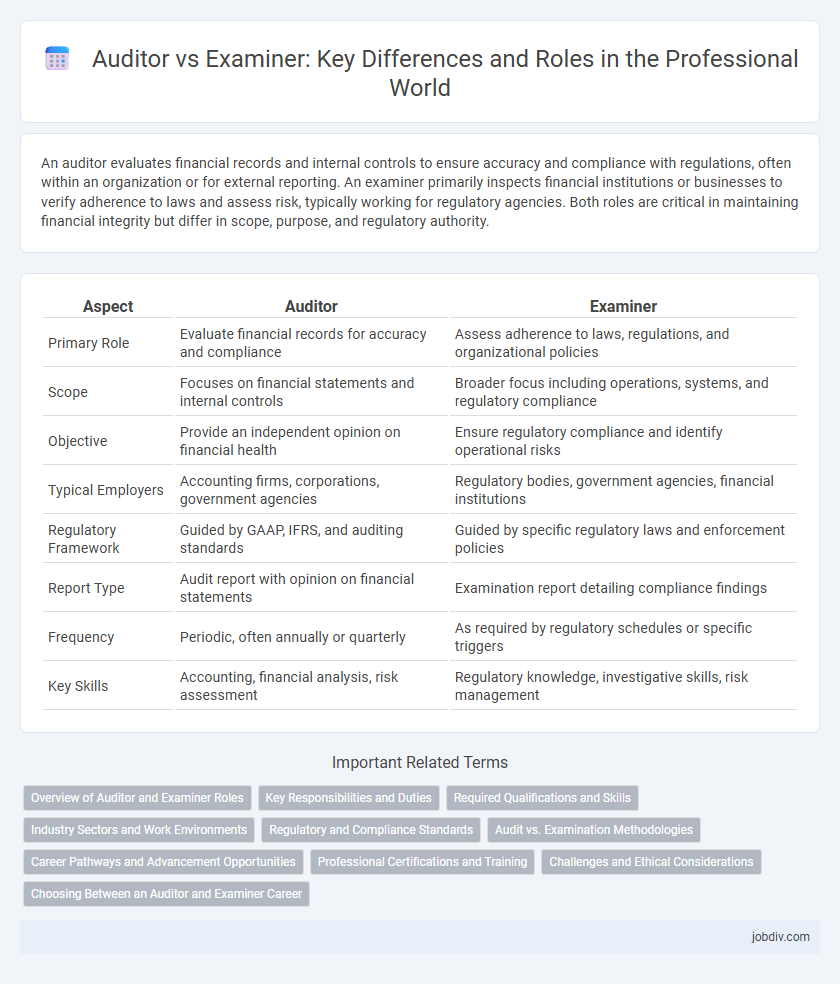An auditor evaluates financial records and internal controls to ensure accuracy and compliance with regulations, often within an organization or for external reporting. An examiner primarily inspects financial institutions or businesses to verify adherence to laws and assess risk, typically working for regulatory agencies. Both roles are critical in maintaining financial integrity but differ in scope, purpose, and regulatory authority.
Table of Comparison
| Aspect | Auditor | Examiner |
|---|---|---|
| Primary Role | Evaluate financial records for accuracy and compliance | Assess adherence to laws, regulations, and organizational policies |
| Scope | Focuses on financial statements and internal controls | Broader focus including operations, systems, and regulatory compliance |
| Objective | Provide an independent opinion on financial health | Ensure regulatory compliance and identify operational risks |
| Typical Employers | Accounting firms, corporations, government agencies | Regulatory bodies, government agencies, financial institutions |
| Regulatory Framework | Guided by GAAP, IFRS, and auditing standards | Guided by specific regulatory laws and enforcement policies |
| Report Type | Audit report with opinion on financial statements | Examination report detailing compliance findings |
| Frequency | Periodic, often annually or quarterly | As required by regulatory schedules or specific triggers |
| Key Skills | Accounting, financial analysis, risk assessment | Regulatory knowledge, investigative skills, risk management |
Overview of Auditor and Examiner Roles
Auditors conduct systematic evaluations of financial statements to ensure accuracy and compliance with accounting standards and regulatory requirements. Examiners review and analyze records, processes, and policies within organizations to assess operational efficiency and regulatory adherence. Both roles play critical parts in maintaining transparency, accountability, and integrity in financial and operational reporting.
Key Responsibilities and Duties
Auditors primarily assess financial records and internal controls to ensure accuracy and regulatory compliance, conducting detailed audits and reporting findings to management. Examiners focus on evaluating specific industries or institutions, such as banks or insurance companies, by reviewing operations, risk management, and adherence to laws and regulations. Both roles require thorough analytical skills, but auditors emphasize financial accuracy while examiners prioritize regulatory compliance and operational integrity.
Required Qualifications and Skills
Auditors typically require a CPA license or equivalent certification, combined with strong analytical skills, attention to detail, and proficiency in accounting principles and regulatory compliance. Examiners often hold degrees in finance, economics, or business administration and demonstrate expertise in risk assessment, investigative techniques, and regulatory knowledge specific to their sector. Both roles demand strong communication skills and ethical judgment to ensure accurate evaluation and reporting.
Industry Sectors and Work Environments
Auditors primarily operate within financial services, manufacturing, and corporate sectors, conducting detailed financial reviews to ensure regulatory compliance and accuracy in reporting. Examiners often work in government agencies, banking, and insurance industries, focusing on risk assessment and adherence to industry-specific regulations. Both roles require expertise in regulatory frameworks, but auditors typically engage with broader industry sectors while examiners specialize in regulatory enforcement within specific work environments.
Regulatory and Compliance Standards
Auditors evaluate financial records and processes to ensure adherence to regulatory and compliance standards such as GAAP, IFRS, or SOX, focusing on accuracy and internal controls. Examiners assess operational compliance with specific industry regulations, often conducted by government agencies to enforce legal standards like banking laws or insurance regulations. Both roles require thorough knowledge of regulatory frameworks to mitigate risks and ensure organizational accountability.
Audit vs. Examination Methodologies
Audit methodologies emphasize risk assessment, internal control evaluation, and substantive testing to provide reasonable assurance on financial statement accuracy. Examination methodologies focus on detailed verification and compliance testing to substantiate specific financial information or regulatory requirements. Both approaches utilize sampling techniques, but audits prioritize overall financial health while examinations target precise validation.
Career Pathways and Advancement Opportunities
Auditors typically follow career pathways that emphasize financial accountability, risk management, and compliance, often advancing to senior audit manager or chief audit executive roles within corporations or accounting firms. Examiners, especially in regulatory agencies or financial institutions, focus on compliance and enforcement, with advancement opportunities including senior examiner, compliance director, or regulatory affairs specialist positions. Both career paths offer growth potential through specialized certifications, such as CPA for auditors and CAMS for examiners, enhancing professional credibility and leadership prospects.
Professional Certifications and Training
Professional certifications such as CPA (Certified Public Accountant) and CIA (Certified Internal Auditor) are crucial for auditors, emphasizing financial expertise and compliance knowledge. Examiners often pursue certifications like CAMS (Certified Anti-Money Laundering Specialist) or CRCM (Certified Regulatory Compliance Manager) to specialize in regulatory review and risk assessment. Both roles require continuous professional training to stay updated with evolving standards and regulatory frameworks in auditing and examination fields.
Challenges and Ethical Considerations
Auditors face the challenge of maintaining independence while evaluating financial statements to prevent conflicts of interest, which is critical for ensuring unbiased assessments. Examiners must navigate regulatory complexities and adhere strictly to ethical standards to guarantee compliance and protect stakeholder interests. Both roles demand rigorous adherence to confidentiality, integrity, and objectivity to uphold public trust and professional credibility.
Choosing Between an Auditor and Examiner Career
Choosing between an auditor and examiner career depends on your interest in financial accuracy versus investigative analysis. Auditors specialize in evaluating financial statements and compliance, ensuring transparency for stakeholders, while examiners focus on assessing institutions' adherence to regulations, often within banking or insurance sectors. Consider your preference for detailed financial reviews or regulatory risk assessment to determine the optimal career path.
Auditor vs Examiner Infographic

 jobdiv.com
jobdiv.com